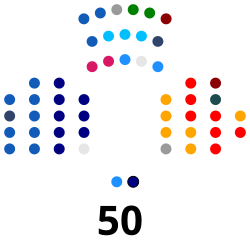Senate of Chile
Upper house of National Congress of Chile From Wikipedia, the free encyclopedia
This article's factual accuracy may be compromised due to out-of-date information. (January 2023) |
Senate of the Republic of Chile Senado de la República de Chile | |
|---|---|
| 56th National Congress | |
 Seal | |
| Type | |
| Type | |
Term limits | None |
| Leadership | |
Vice-President | |
General Secretary | Raúl Guzmán Uribe since 16 April 2021 |
| Structure | |
| Seats | 50 |
 | |
Political groups | Government (18)
External support (5)
Opposition (27)
|
Length of term | 8 years |
| Elections | |
| Open list Proportional representation | |
Last election | 21 November 2021 |
Next election | 2025 |
| Meeting place | |
 | |
| Senate Chamber, National Congress Building, Valparaíso, Chile | |
| Website | |
| http://www.senado.cl | |
The Senate of the Republic of Chile is the upper house of Chile's bicameral National Congress, as established in the current Constitution of Chile.
Composition
Summarize
Perspective
According to the present Constitution of Chile, the Senate is composed of forty-three directly elected senators, chosen by universal popular suffrage vote in 16 senatorial circumscriptions. These serve eight-year terms, with half of them being replaced every fourth year. They must be eligible to vote, have completed secondary school, or its equivalent, and be at least 35 years old.
The Senate meets at the new National Congress building located in the port city of Valparaíso that replaced the old National Congress building located in downtown Santiago, the nation's capital.
Abolition of the unelected
Amendments to the Constitution, approved by a joint session of Congress on August 16, 2005, eliminated non-directly elected senators from March 11, 2006, the day 20 newly elected senators were sworn in, leaving the total number of senators at 38, all directly elected. Previously, according to the Constitution of 1980, "designated" or "institutional" senators were appointed to the chamber. Two former heads of state, Eduardo Frei Ruiz-Tagle and Augusto Pinochet, were installed as senators for life. Pinochet later resigned from this position and Frei lost his seat in the 2005 reform. However, Frei remained in the Senate by winning an elective seat.
Historical evolution
Summarize
Perspective
The Senate of Chile was created in 1812 to support the formulations of policies of the Government Junta. Since then it has undergone several constitutional reorganizations that have altered the scope of its constitutional powers, its composition and the generation of its members.
First senate
Created by Article 7 of the Provisional Constitutional Manual of 1812. It was composed of seven titular members (one for each province) and three alternate members and was supposed to serve as a counterbalance to the executive power of the Government Junta. The senators were directly nominated by the provinces in agreement with the central government. It functioned from November, 1812 to January, 1814, when it was reorganized to better respond to the problems caused by the successive military defeats at the hands of the advancing Spanish Army.
Consultative senate
Created by Article 13 of the Provisional Government Manual of 1814. As its predecessor, it was composed of seven titular members (only) nominated by the provinces in lists of three from which they were selected by the Supreme Director. It functioned from March to July, 1814, when the Spanish Army captured Santiago, putting an end to the Patria Vieja government.
First conservative senate
Created by Title III of the Constitution of 1818. It was composed of five titular members and five alternate members selected directly by the Supreme Director. It was supposed to function only when the lower house was not in function or could not meet, and had the power to enact "provisory rules" that had the same effect as laws (hence the "conservative" moniker, because it "conserved" the power.) It functioned from October, 1818 to May, 1822.
Current composition Senate of Chile
Summarize
Perspective
See also
Notes
External links
Wikiwand - on
Seamless Wikipedia browsing. On steroids.


















































